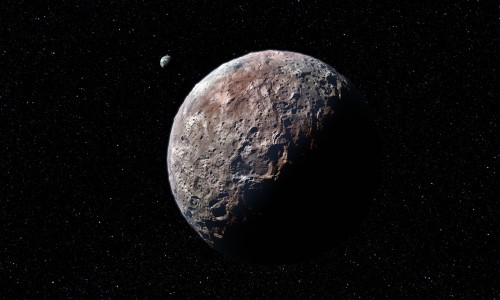Tag archives: Kennedy Space Center
Florida’s declining Space Coast, naming mountains on Pluto and silly rock bands

Name game: does that crater look like a Steve, or maybe a Carol? (Courtesy: IAU/L Calçada)
By Hamish Johnston
When I was a young lad back in the late 1960s, my family would join the annual March migration of Canadians to Florida. Along with alligator farms and the endless beaches, the Kennedy Space Center was a popular tourist destination and I can still remember visiting it and getting a solar spinner globe as a souvenir. Sadly, since the end of the Space Shuttle programme in 2011, Florida’s “Space Coast” has fallen on hard times. While there are still rocket launches – there are two planned for April – thousands of NASA employees have been let go and the surrounding communities look worse for wear. The New York-based photographer Rob Stephenson has put together a collection of images taken in and around the centre that he calls “Myths of the Near Future”. To me the photographs evoke the allure of the space age as well as the inevitable decline of any human endeavour.
View all posts by this author | View this author's profile
Homework help from NASA, rescue missions, top technologies and more
By Tushna Commissariat
Who doesn’t like a bit of help with their homework – not 4-year-old Lucas Whiteley from West Yorkshire in the UK. When faced with some tough and rather complex scientific questions, the enterprising child filmed a video of himself asking the US space agency NASA for some help. And much to his delight, he got a video response courtesy of NASA engineer Ted Garbeff of the Ames Research Center in California. In the 10-minute video, Garbeff answers Whiteley’s questions including “How many stars are there?” and “Did any animals go to the Moon?” Of course, the story garnered nation-wide interest and was covered by the Huffington Post, the Telegraph and others. Take a look at Garbeff’s response video above.
View all posts by this author | View this author's profile
Atlantis lifts off into history
By Tushna Commissariat
Despite gloomy weather conditions that threatened to cancel the launch altogether, NASA’s shuttle Atlantis has launched from the Kennedy Space Center. Marking the last and final flight of the Space Shuttle Programme – STS-135 – Atlantis and a four-person crew are on a 12-day mission to deliver more than 3.5 tonnes of supplies to the International Space Station (ISS). This final stock should keep the station running for a year. Although the countdown stopped briefly at 31 s before the launch, the shuttle had a “flawless” lift-off, according to NASA. It has now settled down into its preliminary orbit ahead of its rendezvous with the ISS this Sunday morning.
The image above is of the shuttle, taken shortly after the rotating service structure was rolled back yesterday at Launch Pad 39A at the Kennedy Space Centre in Florida (Credit: NASA/Bill Ingalls). Below is an image of the mission patch for this final iconic flight (Credit: NASA).

“The shuttle’s always going to be a reflection of what a great nation can do when it commits to be bold and follow through,” said astronaut Chris Ferguson, commander of the mission, from the cockpit of Atlantis minutes before the launch. “We’re completing a chapter of a journey that will never end. Let’s light this fire one more time, and witness this great nation at its best.”
Atlantis was the fourth orbiter built and had its maiden voyage on 3 October 1985. Atlantis had a number of firsts to its name – it was the first shuttle to deploy a probe to another planet, to dock to the ISS and the first with a glass cockpit! It conducted a final servicing mission to the Hubble Space Telescope in May 2009.
NASA has decided to retire its shuttle programme with this last flight because the vehicles are too costly to maintain. It now intends to contract out space transport to private companies. The hope is that this will free NASA resources to invest in a other programmes that will potentially send humans beyond the space station to the Moon, Mars and maybe even asteroids.
Atlantis is also carrying some rather unusual passengers – some simple yeast cells. The aim is to study the yeast cells as their genetic make up is remarkably similar to that of a human cell. This makes it an ideal system for studying genetic defects and understanding how these defects may manifest in human disease. In two separate experiments – conducted at the ISS – researchers will study the effect of microgravity on cell growth.
The video below has the crew of Atlantis talking about the “vibrancy of the ISS as a stepping stone for NASA’s plans for future human exploration beyond low Earth orbit”.
View all posts by this author | View this author's profile
